Bridge between the Terrestrial and the Beyond
- Theory and Practice of Transcommunication -
by Hildegard Schaefer (†)
back to Book Content
10. The diode recording method
This recording method has been devised by Prof. Alex Schneider,
St. Gallen ,
Switzerland
. It enables receiving from the short-wave range up into the long-wave range so that different frequencies can be received simultaneously without any switching.
The device is very small and can be rebuilt even by laymen (pls. see circuit diagram). It is connected to the recording unit via cable. In view of the risk of mains hum it should be installed in a small (metal) container.
The diode features the advantage of providing a mix of rays, plus that of its suitability for problem-free rebuilding with low expenditure for material. Over a long period of time the diode has been a very much liked as - either only or additional - appliance for recording, but its being in vogue decreased these last years when other recording methods using different additional equipment came up.
Here is a sketch diagram showing the diode switching principle for do-it-yourselfers:
|

|
Switching diagram legend:
Resistors: R1 and R2 up to 100 kΩ, rating ¼ Watt; capacitors: C1=1 nF, C2=2 nF, test voltage 12-15 V; D = high-frequency diode, approx. AA 116 o.a.; A = antenna, a piece of wire of approx. 8 cm-25 cm length, suit-able for roll-up, empirically determined; B1 = antenna jack; B2 –B3 = microphone connection; B4-B5 = output; G = housing, connected to earthing wire.
The antenna consisting of just a few centimeters of
wire, is placed above a small capacitor of 1 nF and along the diode to prevent hum voltage. The antenna can be plugged to an isolated tip jack fixed to the metal container, or introduced into the housing by passing it through a bore hole. |
Diode, resistors and capacitors are mounted on a small plate or a strip of insulation material, e.g., a strip of Pertinax with soldering lugs or similar means.
For recording tests radio transmitters must be slightly audible. If, by shortening the antenna, the speech or music would be completely eliminated, say the modulation would not be hearable, no “carrying frequency” would be available, and only the microphone voices would come through. The aired programs in the background shall be kept under control; the partners in the Beyond often transform them in a paranormal way into answers to the questions put via the microphone.
The circuitry provides for microphone connection. This enables the simultaneity of the receipt of paranormal voices and the microphone recording. Thus two possibilities for receiving transcendental voices are available, and simultaneously the experimenter’s voice is recorded without the need to switch over.
The load resistors are adapted according to a solution of compromise; they may be chosen in a different appropriate form.
back to Top of Page
|
You are visiting our website: W rld ITC.org To reach our homepage click here please. rld ITC.org To reach our homepage click here please. |
